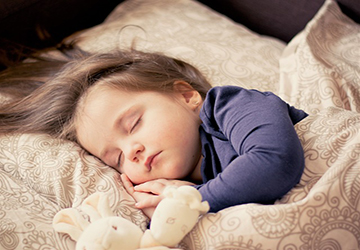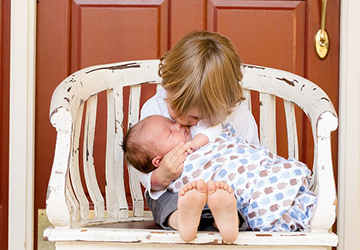The Pros and Cons of Co-Sleeping with Your Baby
As a new parent, one of the most important decisions you will make is whether or not to sleep with your baby. Co-sleeping is when parents share a baby's sleeping space in the same bed or in separate but connected bassinets or cribs. It's a decision that can have both positive and negative consequences, so it's essential to weigh the pros and cons of co-sleeping with your newborn or infant before deciding what's best for your family.
Is it essential to sleep together?
Co-sleeping with your baby is a personal choice, as every baby has different sleep needs and requirements. While not required, there are certain benefits to sleeping with your baby. It is most important to consider the safety aspects of co-sleeping and weigh the pros and cons.

For some parents, sleeping together can help them feel more connected to their baby and make it easier to feed or soothe them late at night. However, it's essential to ensure your baby's sleeping arrangement is safe and avoid placing pillows, blankets, or other hazards in the sleeping area.
If a family decides that co-sleeping isn't the right choice, other ways exist to encourage bonding and keep babies close. Room sharing is an excellent option for parents to keep their children close but in a safe and secure separate sleeping area.
What are the pros and cons of co-sleeping with a newborn or baby?
There are some pros and cons to co-sleeping with your baby, which we've listed to help you create a sleep schedule with your baby.
The benefits of co-sleeping with your baby
l Promote bonding
There's something special about waking up to your baby's soft breathing or his little hands caressing your face. These little bonding moments can bring joy to both parent and baby.
Co-sleeping makes it easier to meet your baby's needs throughout the night. You can quickly and easily calm them down when they're upset or feed them when they're hungry without getting up and going to another room. This takes the stress out of nighttime parenting and strengthens your bond with your baby.
l Comfortable
Co-sleeping can be a beneficial arrangement for breastfeeding mothers, and it provides easy access to the breast so you can quickly feed your baby when he's hungry without leaving the bed. This is especially important in the first few weeks and months, as your baby drinks a lot and needs to eat around the clock. Plus, co-sleeping with your baby helps regulate your baby's breathing, body temperature, and heart rate, making it a more natural and nurturing way of caring for them.
Of course, it's essential to make sure you co-sleep safely and responsibly. This means avoiding pillows, blankets, or other potential hazards in the sleeping area and ensuring your baby has a safe place to sleep if you decide not to share the bed with others.
l Can improve sleep
When parents choose to co-sleep with their baby, it allows everyone involved to sleep better; it is one of the essential benefits of co-sleeping with a baby. Newborns often sleep better when they are close to their parents, perhaps because they can hear their parents breathing or feel their warmth. As a result, parents may find their baby wakes up less throughout the night, allowing them to sleep more restfully.
Parents feel more relaxed and comfortable when their baby sleeps next to them. It provides comfort and security whenever your child is close by, helping them fall asleep faster and sleep longer.
l Reduce the risk of Sudden Infant Death Syndrome.
A surprising benefit of co-sleeping with your baby is that it reduces the risk of sudden infant death syndrome (SIDS), the leading cause of infant death. Research shows that sharing a room with your baby for at least the first six months of life can reduce the risk of SIDS by up to 50%.
Babies who sleep in the same room as their parents are easier to monitor. They can be treated quickly if they have trouble breathing or other problems while sleeping. Parents can also regulate the baby's breathing and body temperature by being close to the baby, which can further reduce the risk of SIDS. Plus, co-sleeping can help parents recognize when their baby is distressed or having trouble breathing so they can act quickly.

Disadvantages of co-sleeping with baby
l Choking hazard
One of the biggest concerns is the increased risk of choking. The trouble is incredibly big if the parent is under drugs or alcohol or if the baby sleeps on their tummy. It is essential to create a safe sleeping environment by using a separate sleeping surface for the baby and avoiding soft or loose bedding.
l Sleep disturbance
Another potential downside of co-sleeping with a baby is that it can lead to more disturbed sleep for both parent and baby. While your baby's closeness will make it easier to accommodate their needs throughout the night, it also means you'll pay more attention to every tiny noise or movement they make. When babies are around their parents, they may wake up more often, which can disrupt sleep for everyone involved.
l Make the transition more difficult.
Co-sleeping can also make it harder for babies to fall asleep independently as they age. Babies may become overly dependent on their parents' physical presence to help them fall asleep. It's important to consider how co-sleeping will affect your baby's sleep habits in the long run and make sure you're helping him develop healthy sleep habits.
l Limits parental privacy and attachment
Finally, co-sleeping limits the amount of time parents spend together. While putting your baby in bed can make you feel comfortable and comfortable, it can also make it difficult for you to participate in activities that require privacy or intimacy. It's important to consider how co-sleeping can affect your relationship with your partner.
Diploma
Co-sleeping can be a personal and emotional choice for many families. There are benefits to having your baby close to you while sleeping, but it is also essential to carefully weigh the potential risks. By adhering to safe sleeping habits, parents can minimize the risks associated with co-sleeping and make the best decision for themselves and their child!


